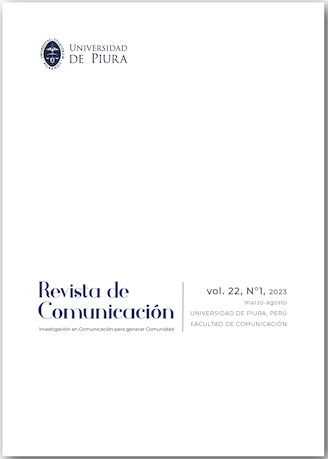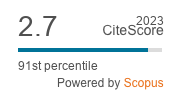Perceived brand value and brand co-creation attitudes through eWOM: a typology of co-creator digital users
DOI:
https://doi.org/10.26441/RC22.1-2023-3075Keywords:
perceived brand value, eWOM, consumer segmentation, cluster analysisAbstract
Brand co-creation is an increasingly ingrained consumer behavior and its effects on the purchasing process have become an object of study. However, the link between perceived brand value and co-creation is still little known. This study principally aims to delve into the relationship between perceived brand and the act of co-creation through eWOM, that is, consumers’ recommendations, comments, and participation on the Internet. The research implements a descriptive and explanatory cross-sectional study design through a sample of 1,521 consumers. Information collection was carried out through an ad hoc online questionnaire focused on co-creation attitudes and perceived brand value and found a sufficiently solid link to affirm that there is a relationship between them. We also differentiated three types of behavior and attitudes towards the co-creation process that consumers develop, as well as the attribution of perceived value to brands with which they interact.
Metrics
References
Aaker, D.A. (1991). Managing Brand Equity. The Free Press.
Alves, H., Fernandes, C., and Raposo, M. (2016). Value co-creation: Concept and contexts of application and study. Journal of Business Research, 5(69), 1626-1633, https://doi.org/10.1016/j.jbusres.2015.10.029. DOI: https://doi.org/10.1016/j.jbusres.2015.10.029
Amegbe, H., and Osakwe, C.N. (2018). Towards achieving strong customer loyalty in the financial services industry: Ghanaian top banks’ customers as a test case. International Journal of Bank Marketing, 36(5), 988-1007. https://doi.org/10.1108/IJBM-06-2017-0120 DOI: https://doi.org/10.1108/IJBM-06-2017-0120
Black, I., and Veloutsou, C. (2017). Working consumers: Co-creation of brand identity, consumer identity and brand community identity. Journal of Business Research, 70, 416-429. http://dx.doi.org/10.1016/j.jbusres.2016.07.012 DOI: https://doi.org/10.1016/j.jbusres.2016.07.012
Boksberger, E.P., and Melsen, L. (2011). Perceived value: a critical examination of definitions, concepts and measures for the service industry. Journal of Services Marketing, 25(3), 229–240. https://doi.org/10.1108/08876041111129209 DOI: https://doi.org/10.1108/08876041111129209
Carcelén García, S. and Díaz-Soloaga, P. (2022). Brand co-creation through eWOM: profile, attitudes and user behavior. Mediterranean Journal of Communicationt, 13(1), 267-284. https://doi.org/10.14198/MEDCOM.19924 DOI: https://doi.org/10.14198/MEDCOM.19924
Essamri, A., Mckechnie, S., and Winklhofer, H. (2019). Co-creating corporate brand identity with online brand communities: A managerial perspective. Journal of Business Research, 96, 366-375.
https://doi.org/10.1016/j.jbusres.2018.07.015 DOI: https://doi.org/10.1016/j.jbusres.2018.07.015
Cossío-Silva, F.J., Revilla, M.A., Vega, M. and Palacios, B. (2016). Value co-creation and customer loyalty. Journal of Business Research, 69(5), 1621-1625. https://doi.org/10.1016/j.jbusres.2015.10.028 DOI: https://doi.org/10.1016/j.jbusres.2015.10.028
Fernández Gómez, D. (2021). Strategic Advertising Mechanisms. From Copy Strategy to Iconic Brands. Intellect Books. DOI: https://doi.org/10.1386/9781789384307
Fernández Gómez, D., y Gordillo-Rodríguez, Mª.T. (2020). Branding de comunidades. Marcas y colectivos de consumo. Editorial UOC.
Flores, J., and Vasquez-Parraga, A. (2015). The impact of choice on co-produced customer value creation and satisfaction. Journal of Consumer Marketing 32, 15-25. http://doi.org/10.1108/JCM-04-2014-0931 DOI: https://doi.org/10.1108/JCM-04-2014-0931
Frow, P., Nenonen, S., Payne, A., and Storbacka, K. (2015). Managing Co-creation Design: A Strategic Approach to Innovation. British Journal of Management, 26(3), 463-483. https://doi.org/10.1111/1467-8551.12087 DOI: https://doi.org/10.1111/1467-8551.12087
Gupta, S., Gallear, D., Rudd, J., and Foroudi, P. (2020). The impact of brand value on brand competitiveness. Journal of Business Research 112, 210-222. https//doi:10.1016/j.jbusres.2020.02.033 DOI: https://doi.org/10.1016/j.jbusres.2020.02.033
Gurviez, P., and Korchia, M. (2003). Proposal for a Multidimensional Brand Trust Scale. 32nd EMAC Conference. Marketing: Responsible and Relevant, 438–452.
Ha, H.Y., Janda, S., and Muthaly, S. (2010). Development of brand equity: evaluation of four alternative models. Service Industries Journal 30(6), 911-928. https://doi-org.bucm.idm.oclc.org/10.1080/02642060802320253 DOI: https://doi.org/10.1080/02642060802320253
Hajli, N., Shanmugam, M., Papagiannidis, S., Zahay, D., and Richard, M.O. (2017). Branding co-creation with members of online brand communities. Journal of Business Research, 70, 136-144. https://doi.org/10.1016/j.jbusres.2016.08.026 DOI: https://doi.org/10.1016/j.jbusres.2016.08.026
Holbrook, M.B. (1994a). The Nature of Customer Value: An Axiology of Services in the Consumption Experience. In Rust, R., and Oliver R.L. (Eds), Service Quality: New Directions in Theory and Practice (pp. 21-71). Sage Publications. DOI: https://doi.org/10.4135/9781452229102.n2
Holbrook, M.B. (1999b). Introduction to Consumer Value. In Holbrook, M.B. (Eds.) Consumer Value. A Framework for Analysis and Research (pp. 1-28). Routledge. DOI: https://doi.org/10.4324/9780203010679.ch0
Interbrand (2021) Annual Report. https://interbrand.com/best-brands/, accessed January 2022.
Instituto Nacional de Estadística – INE Base. (2020). Población residente por fecha, sexo y edad. Instituto Nacional de Estadística. https://bit.ly/31FGcZL
Keller, K.L. (1993a). Conceptualizing, Measuring, and Managing Customer-Based Brand Equity. Journal of Marketing, 57(1), 1-22. https://doi.org/10.1177/002224299305700101 DOI: https://doi.org/10.1177/002224299305700101
Keller, K.L. and Swaminathan, V. (2020b). Strategic Brand Management: Building, Measuring, and Managing Brand Equity. Pearson.
Kennedy, E., and Guzmán, F. (2016). Co-creation of brand identities: consumer and industry influence and motivations. Journal of Consumer Marketing, 33(5), 313-323. https://doi.org/10.1108/JCM-07-2015-1500 DOI: https://doi.org/10.1108/JCM-07-2015-1500
Lam, S.Y., and Shankar, V. (2014). Asymmetries in the effects of drivers of brand loyalty between early and late adopters and across technology generations. Journal of Interactive Marketing, 28(1), 26-42. https://doi.org/10.1016/j.intmar.2013.06.004 DOI: https://doi.org/10.1016/j.intmar.2013.06.004
Loureiro, S.M.C., Gorgus, T., and Kaufmann, H.R. (2017). Antecedents and outcomes of online brand engagement: The role of brand love on enhancing electronic-word-of-mouth. Online Information Review, 41(7), 985-1005. https://doi.org/10.1108/OIR-08-2016-0236 DOI: https://doi.org/10.1108/OIR-08-2016-0236
Merz, M.A., Zarantonello, L., and Grappi, S. (2018). How valuable are your customers in the brand value co-creation process? The development of a Customer Co-Creation Value (CCCV) scale. Journal of Business Research, 82, 79-89. http://doi.org/10.1016/j.jbusres.2017.08.018 DOI: https://doi.org/10.1016/j.jbusres.2017.08.018
Pahud de Mortanges, Ch., and Van Riel, A. (2003). Brand Equity and Shareholder Value. European Management Journal, 21(4), 521-527. https://doi.org/10.1016/S0263-2373(03)00076-8 DOI: https://doi.org/10.1016/S0263-2373(03)00076-8
Prahalad, C.K., and Ramaswamy, V. (2002). The co-creation connection. Strategy and Business, 27, 50-61.
Prahalad, C.K., and Ramaswamy, V. (2004). Co-creation experiences: The next practice in value creation. Journal of Interactive Marketing, 18(3), 5-14. https://doi.org/10.1002/dir.20015 DOI: https://doi.org/10.1002/dir.20015
Priharsari, D., Abedin, B., and Mastio, E. (2020). Value co-creation in firm sponsored online communities: What enables, constrains, and shapes value. Internet Research, 30(3), 763-788. https://doi.org/10.1108/INTR-05-2019-0205 DOI: https://doi.org/10.1108/INTR-05-2019-0205
Raggio, R.D., and Leone, R.P. (2007). The theoretical separation of brand equity and brand value: managerial implications for strategic planning. Journal of Brand Management, 14, 380-395. https://doi.org/10.1057/palgrave.bm.2550078 DOI: https://doi.org/10.1057/palgrave.bm.2550078
Ranjan, K.R., and Read, S. (2016). Value co-creation: concept and measurement. Journal of the Academy of Marketing Science, 44(3), 290-315 https://doi.org/10.1007/s11747-014-0397-2
Ramaswamy, V., and Ozcan, K. (2018). What is co-creation? An interactional creation framework and its implications for value creation. Journal of Business Research, 84, 196-205. https://doi.org/10.1016/j.jbusres.2017.11.027 DOI: https://doi.org/10.1016/j.jbusres.2017.11.027
Ranjan, K. R., and Read, S. (2016). Value co-creation: concept and measurement. Journal of the Academy of Marketing Science, 44(3), 290-315. https://doi:10.1007/s11747-014-0397-2 DOI: https://doi.org/10.1007/s11747-014-0397-2
Rosario, A.B., Sotgiu, F., De Valck, K., and Bijmolt, T.H.A. (2016). The Effect of Electronic Word of Mouth on Sales: A Meta-Analytic Review of Platform, Product, and Metric Factors. Journal of Marketing Research, 53(3), 297-318. DOI: https://doi.org/10.1509/jmr.14.0380
Saha, V., Mani, V., and Goyal, P. (2020). Emerging trends in the literature of value co-creation: a bibliometric analysis. Benchmarking: An International Journal, 27(3) 981-1002. https://doi.org/10.1108/BIJ-07-2019-0342 DOI: https://doi.org/10.1108/BIJ-07-2019-0342
Sánchez-Fernández R., and Iniesta-Bonillo, M.Á. (2007). The concept of perceived value: a systematic review of the research. Journal of Marketing Theory, 7(4), 427-451. https://doi.org/10.1177/1470593107083165 DOI: https://doi.org/10.1177/1470593107083165
Sarkar, S., and Banerjee, S. (2019). Brand co-creation through triadic stakeholder participation. European Business Review, 31, 585-609. https://doi.org/10.1108/ebr-04-2018-0079 DOI: https://doi.org/10.1108/EBR-04-2018-0079
Schmeltz, L., and Kjeldsen, A.K. (2019). Co-creating polyphony or cacophony? A case study of a public organization’s brand co-creation process and the challenge of orchestrating multiple internal voices. Journal of Brand Management, 26, 304–316 https://doi.org/10.1057/s41262-018-0124-2 DOI: https://doi.org/10.1057/s41262-018-0124-2
Tajvidi, M., Richard, M.O., Wang, Y. and Hajli, N. (2018a). Brand Co-creation through social commerce information sharing: the role of social media. Journal of Business Research, 121, 476-486 https://doi.org/10.1016/j.jbusres.2018.06.008 DOI: https://doi.org/10.1016/j.jbusres.2018.06.008
Tajvidi, M., Wang, Y., Hajli, N. and Love, P. E.D (2021b). Brand value co-creation in social commerce: the role of interactivity, social support, and relationship quality. Computers in Human Behavior, 115. https://doi.org/10.1016/J.CHB.2017.11.006 DOI: https://doi.org/10.1016/j.chb.2017.11.006
Tiwari, M.K. (2010). Separation of Brand Equity and Brand Value. Global Business Review, 11(3), 421-434. https://doi.org/10.1177/097215091001100307 DOI: https://doi.org/10.1177/097215091001100307
Tommasetti, A., Troisi, O., and Vesci, M. (2017). Measuring customer value co-creation behavior. Journal of Service Theory and Practice, 27(5), 930-950. https://doi.org/10.1108/JSTP-10-2015-0215 DOI: https://doi.org/10.1108/JSTP-10-2015-0215
Tran, T.B.H., and Vu, A.D. (2021). From customer value co-creation behaviour to customer perceived value. Journal of Marketing Management, 37, 993-1026. https://doi.org/10.1080/0267257X.2021.1908398 DOI: https://doi.org/10.1080/0267257X.2021.1908398
Vargo, S.L., and Lusch, R.F. (2008). Service-dominant logic: continuing the evolution. Journal of the Academy of Marketing Science, 36, 1-10. https://doi.org/10.1007/s11747-007-0069-6 DOI: https://doi.org/10.1007/s11747-007-0069-6
Vargo, S., and Lusch, R.F. (2016). Institutions and axioms: an extension and update of service-dominant logic. Journal of the Academy of Marketing Science, 44(1), 5-23. https://doi.org/10.1007/s11747-015-0456-3 DOI: https://doi.org/10.1007/s11747-015-0456-3
Vieira, V.A. (2013). Antecedents and consequences of perceived value: A meta-analytical perspective. Journal of Customer Behaviour, 12(2/3), 111-133. https://doi.org/10.1362/147539213X13832198548210 DOI: https://doi.org/10.1362/147539213X13832198548210
Washburn, J., Till, B.D., and Priluck R. (2000). Co-branding: brand equity and trial effects. The Journal of Consumer Marketing, 17(7), 591-604. https://doi.org/10.1108/07363760010357796 DOI: https://doi.org/10.1108/07363760010357796
Zare, S., Bettiga, D., and Lamberti, L. (2019). Does one design fit them all? Study of drivers of co-creation interest along different consumer segments. Journal of Strategic Marketing, 27(7), 630-650. https://doi.org/10.1080/0965254X.2018.1464051 DOI: https://doi.org/10.1080/0965254X.2018.1464051
Published
How to Cite
Issue
Section
License
Copyright (c) 2023 Revista de Comunicación

This work is licensed under a Creative Commons Attribution-NonCommercial-NoDerivatives 4.0 International License.
Funding data
-
Banco Santander
Grant numbers PR87/19-22686












 Portal de Revistas de la Universidad de Piura.
Portal de Revistas de la Universidad de Piura.